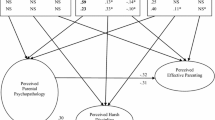Abstract
Theoretical models suggest that child behaviors influence parenting behaviors, and specifically that unpleasant child behaviors coerce parents to discontinue engaging in appropriate discipline. This study examined reciprocal relationships between parenting behaviors (supervision, communication, involvement, timid discipline and harsh punishment) and child disruptive disorder symptoms (ADHD, ODD and CD) in a clinic-referred sample of 177 boys. Annual measures, including structured clinical interviews, were obtained from the beginning of the study (when boys were between the ages of 7 to 12) to age 17. Specific reciprocal influence was observed; only timid discipline predicted worsening behavior, namely ODD symptoms, and ODD symptoms predicted increases in timid discipline. Greater influence from child behaviors to parenting practices was found: ODD also predicted poorer communication and decreased involvement, and CD predicted poorer supervision. ADHD was neither predictive of, nor predicted by, parenting behaviors. The results are specifically supportive of a coercive process between child behaviors and parenting behaviors, and generally suggestive of greater influence of child behaviors on parenting behaviors than of parenting behaviors on child behaviors


Similar content being viewed by others

References
American Psychiatric Association (1994). Diagnostic and statistical manual of mental disorders, (4th ed.). Washington, DC: American Psychiatric Association.
Anastopoulos, A. D., Guevremont, D. C., Shelton, T. L., & Dupaul, G. J. (1992). Parenting stress among families of children with attention deficit hyperactivity disorder. Journal of Abnormal Child Psychology, 20, 503–520.
Brody, G. H., Ge, X., Kim, S. Y., Murry, V. M., Simons, R. L., Gibbons, F. X., et al. (2003). Neighborhood disadvantage moderates associations of parenting and older sibling problem attitudes and behavior with conduct disorders in African American children. Journal of Consulting and Clinical Psychology, 71(2), 211–222.
Burke, J. D., Loeber, R., & Birmaher, B. (2002). Oppositional defiant disorder and conduct disorder: A review of the past 10 years, Part II. Journal of the American Academy of Child and Adolescent Psychiatry, 41(11), 1275–1293.
Burke, J. D., Loeber, R., Lahey, B. B., & Rathouz, P. J. (2005). Developmental transitions among affective and behavioural disorders in adolescent boys. Journal of Child Psychology & Psychiatry, 46, 1200–1210.
Burns, G. L., Walsh, J. A., Owen, S. M., & Snell, J. (1997a). Internal validity of attention deficit hyperactivity disorder, oppositional defiant disorder, and overt conduct disorder symptoms in young children - Implications from teacher ratings for a dimensional approach to symptom validity. Journal of Clinical Child Psychology, 26(3), 266–275.
Burns, B. J., Costello, E. J., Erkanli, A., Tweed, D. L., Farmer, E. M. Z., & Angold, A. (1997b). Insurance coverage and mental health service use by adolescents with serious emotional disturbance. Journal of Child and Family Studies, 6, 89–111.
Bussing, R., Gary, F. A., Mason, D. M., Leon, C. E., Sinha, K., & Garvan, C. W. (2003a). Child temperament, ADHD and caregiver strain: Exploring relationships in an epidemiological sample. Journal of the American Academy of Child & Adolescent Psychiatry, 42(2), 184–192.
Bussing, R., Zima, B. T., Gary, F. A., Mason, D. M., Leon, C. E., Sinha, K., et al. (2003b). Social networks, caregiver strain, and utilization of mental health services among elementary school students at high risk for ADHD. Journal of the American Academy of Child & Adolescent Psychiatry, 42, 842–850.
Cohen, J. (1960). A coefficient of agreement for nominal scales. Educational and Psychological Measurement, 20, 37–46.
Costello, A. J., Edelbrock, C., Dulcan, M. K., Kalas, R., & Klaric, S. (1987). Diagnostic Interview Schedule for Children (DISC). Pittsburgh, PA.
Diggle, P. J., Liang, K.-Y., & Zeger, S. L. (1994). Analysis of longitudinal data. Oxford: Clarendon.
Edelbrock, C., & Achenbach, T. A. (1984). The teacher version of the child behavior profile: I. Boys aged 6–11. Journal of Consulting and Clinical Psychology, 52, 207–217.
Edwards, G., Barkley, R. A., Laneri, M., Fletcher, K., & Metevia, L. (2001). Parent–adolescent conflict in teenagers with ADHD and ODD. Journal of Abnormal Child Psychology, 29, 557–572.
Endicott, J., & Spitzer, R. L. (1978). A diagnostic interview: The schedule for affective disorders and schizophrenia. Archives of General Psychiatry, 35(7), 837–844.
Farrington, D. P., Jolliffe, D., Loeber, R., Stouthamer-Loeber, M., & Kalb, L. M. (2001). The concentration of offenders in families, and family criminality in the prediction of boys’ delinquency. Journal of Adolescence, 24(5), 579–596.
Frick, P. J., Lahey, B. B., Loeber, R., Stouthamer-Loeber, M., Christ, M. A., & Hanson, K. (1992). Familial risk factors to oppositional defiant disorder and conduct disorder: Parental psychopathology and maternal parenting. Journal of Consulting and Clinical Psychology, 60(1), 49–55.
Gomez, R., & Sanson, A. V. (1994). Mother–child interactions and noncompliance in hyperactive boys with and without conduct problems. Journal of Child Psychology and Psychiatry and Allied Disciplines, 35, 477–490.
Greene, R. W., Ablong, J. S., & Goring, J. C. (2003). A transactional model of oppositional behavior: underpinnings of the collaborative problem solving approach. Journal of Psychosomatic Research, 55, 67–75.
Greene, R. W., & Doyle, A. E. (2000). Toward a transactional conceptualization of oppositional defiant disorder: Implications for treatment and assessment. Clinical Child and Family Psychology Review, 2, 129–148.
Hartman, C. A., Hox, J., Mellenberg, G. J., Boyle, M. H., Offord, D. R., Racine, Y., et al. (2001). DSM-IV internal construct validity: When a taxonomy meets data. Journal of Child Psychology and Psychiatry, 42, 817–836.
Hollingshead, A. B. (1975). Four factor index of social status. Unpublished manuscript, Department of Sociology at Yale University, MA.
Huh, D., Tristan, J., Wade, E., & Stice, E. (2006). Does problem behavior elicit poor parenting?: A prospective study of adolescent girls. Journal of Adolescent Research, 21, 185–204.
Johnston, C. (1996). Parent characteristics and parent–child interactions in families of nonproblem children and ADHD children with higher and lower levels of oppositional-defiant behavior. Journal of Abnormal Child Psychology, 24, 85–104.
Lahey, B. B., Loeber, R., Hart, E. L., Frick, P. J., Applegate, B., & Zhang, Q. (1995). Four-year longitudinal study of conduct disorder in boys: patterns and predictors of persistence. Journal of Abnormal Psychology, 104(1), 83–93.
Lahey, B. B., Loeber, R., Stouthamer-Loeber, M., Christ, M. A. G., Green, S., & Russo, M. F. (1990). Comparison of DSM-III and DSM-III-R diagnoses for prepubertal children: Changes in prevalence and validity. Journal of the American Academy of Child and Adolescent Psychiatry, 29, 620–626.
Lahey, B. B., McBurnett, K., & Loeber, R. (2000). Are attention-deficit/hyperactivity disorder and oppositional defiant disorder developmental precursors to conduct disorder? In A. Sameroff, M. Lewis & S. M. Miller (Eds.), Handbook of developmental psychopathology (2nd ed., pp. 431–446). New York, NY: Plenum.
Laird, R. D., Pettit, G. S., Bates, J. E., & Dodge, K. A. (2003). Parents’ monitoring relevant knowledge and adolescents’ delinquent behavior: Evidence of correlated developmental changes and reciprocal influences. Child Development, 74, 752–768.
Loeber, R., Burke, J. D., Lahey, B. B., Winters, A., & Zera, M. (2000a). Oppositional defiant and conduct disorder: A review of the past 10 years, Part I. Journal of the American Academy of Child and Adolescent Psychiatry, 39, 1468–1484.
Loeber, R., Green, S. M., Keenan, K., & Lahey, B. B. (1995). Which boys will fare worse? Early predictors of the onset of conduct disorder in a six-year longitudinal study. Journal of the American Academy of Child and Adolescent Psychiatry, 34, 499–509.
Loeber, R., Green, S. M., Lahey, B. B., Frick, P. J., & McBurnett, K. (2000b). Findings on disruptive behavior disorders from the first decade of the developmental trends studies. Clinical Child and Family Psychology Review, 3, 37–60.
Loeber, R., Farrington, D. P., Stouthamer-Loeber, M., & Van Kammen, W. B. (1998). Antisocial behaviour and mental health problems: Explanatory factors in childhood and adolescence. Mahwah, NJ: Erlbaum.
Loeber, R., Green, S. M., Lahey, B. B., & Stouthamer-Loeber, M. (1989). Optimal informants on childhood disruptive behaviors. Development and Psychopathology, 1, 317–337.
Maughan, B., Rowe, R., Messer, J., Goodman, R., & Meltzer, H. (2004). Conduct disorder and oppositional defiant disorder in a national sample: developmental epidemiology. Journal of Child Psychology and Psychiatry, 45, 609–621.
McLoyd, V. C. (1998). Socioeconomic disadvantage and child development. American Psychologist, 53(2), 185–204.
Nock, M. K., Kazdin, A. E., Hiripi, E., & Kessler, R. C. (2007). Lifetime prevalence, correlates, and persistence of oppositional defiant disorder: results from the National Comorbidity Survey Replication. Journal of Child Psychology and Psychiatry, 48(7), 703–713.
Pardini, D. A. (2008). Empirically supported treatments for conduct disorders in children and adolescents. In J. A. Trafton & W. Gordon (Eds.), Best practices in the behavioral management of disorders of infancy, childhood and adolescence. Los Altos, CA: Institute for Brain Potential (in press).
Pardini, D., Obradovic, J., & Loeber, R. (2006). Interpersonal callousness, hyperactivity/impulsivity, inattention, and conduct problems as precursors to delinquency persistence in boys: A comparison of three grade-based cohorts. Journal of Clinical Child and Adolescent Psychology, 35(1), 46–59.
Patterson, G. R. (1982). A social learning approach, Volume 3: Coercive family process. Eugene, OR: Castalia Publishing Company.
Patterson, G. R., & Reid, J. B. (1970). Reciprocity and coercion: Two facets of social systems. In C. Neuringer, & J. Michael (Eds.) Behavior modification in clinical psychology. New York: Appleton-Century-Crofts.
Petersen, A. C., Crockett, L., Richards, M., & Boxer, A. (1988). A self-report measure of pubertal status: Reliability, validity, and initial norms. Journal of Youth and Adolescence, 17, 117–133.
Podolski, C. L., & Nigg, J. T. (2001). Parent stress and coping in relation to child ADHD severity and associated child disruptive behavior problems. Journal of Clinical Child Psychology, 30(4), 503–513.
StataCorp (2001). Stata statistical software: Release 7.0. College Station, TX: Stata Corporation.
Stice, E., & Barrera, M. (1995). A longitudinal examination of the reciprocal relations between perceived parenting and adolescents substance use and externalizing behaviors. Developmental Psychology, 31, 322–334.
Stormshak, E. A., Bierman, K. L., McMahon, R. J., & Lengua, L. J. (2000). Parenting practices and child disruptive behavior problems in early elementary school. Journal of Clinical Child Psychology, 29, 17–29.
Teagle, S. E. (2002). Parental problem recognition and child mental health service use. Mental Health Services Research, 4(4), 257–266.
van Lier, P. A., van der Ende, J., Koot, H. M., & Verhulst, F. C. (2007). Which better predicts conduct problems? The relationship of trajectories of conduct problems with ODD and ADHD symptoms from childhood into adolescence. Journal of Child Psychology and Psychiatry, 48(6), 601–608.
Wakschlag, L. S., Gordon, R. A., Lahey, B. B., Loeber, R., Green, S. M., & Leventhal, B. N. (2000). Maternal age at first birth and boys’ risk for conduct disorder. Journal of Research on Adolescence, 10, 417–441.
Wakschlag, L. S., Lahey, B. B., Loeber, R., Green, S. M., Gordon, R. A., & Leventhal, B. L. (1997). Maternal smoking during pregnancy and the risk of conduct disorder in boys. Archives of General Psychiatry, 54(7), 670–676.
Wasserman, G. A., Miller, L. S., Pinner, E., & Jaramillo, B. (1996). Parenting predictors of early conduct problems in urban, high-risk boys. Journal of the American Academy of Child and Adolescent Psychiatry, 35, 1227–1235.
Acknowledgment
This study was supported by a grant (MH 42529) from the National Institute of Mental Health to Dr. Loeber.
Author information
Authors and Affiliations
Corresponding author
Rights and permissions
About this article
Cite this article
Burke, J.D., Pardini, D.A. & Loeber, R. Reciprocal Relationships Between Parenting Behavior and Disruptive Psychopathology from Childhood Through Adolescence. J Abnorm Child Psychol 36, 679–692 (2008). https://doi.org/10.1007/s10802-008-9219-7
Received:
Accepted:
Published:
Issue Date:
DOI: https://doi.org/10.1007/s10802-008-9219-7



